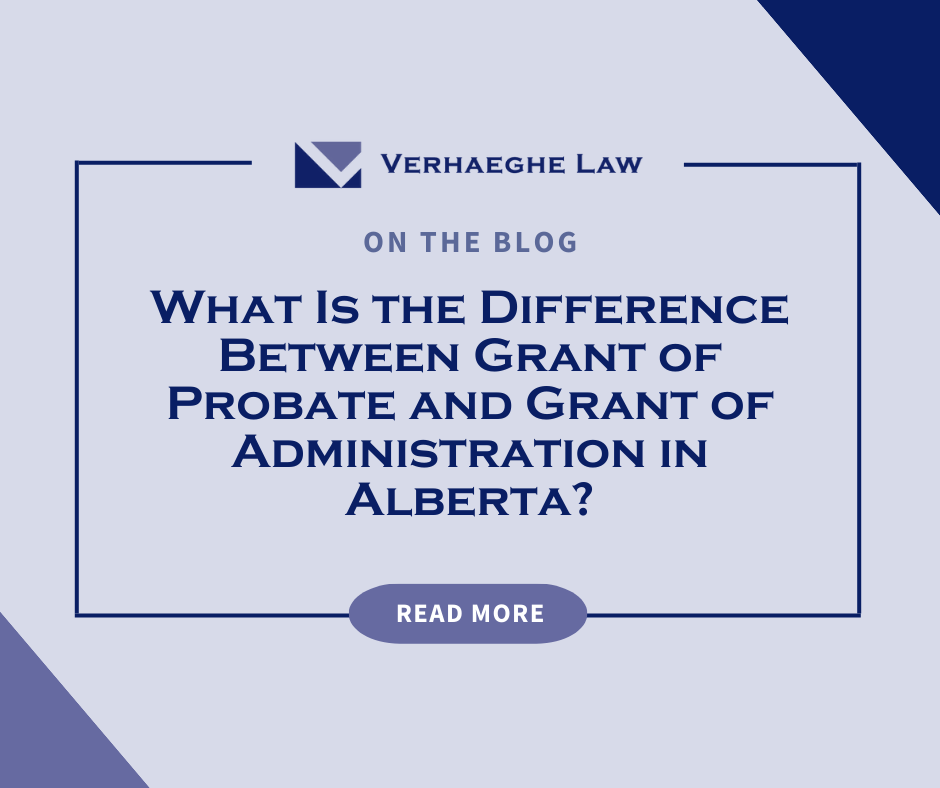What Is the Difference Between Grant of Probate and Grant of Administration in Alberta?

After a person dies, decisions must be made as to what to do with their estate. A grant of probate and a grant of administration are both legal processes involved in this aftermath, but they have different applications and are used under different circumstances. If you have questions about grant of probate and grant of administration, or any other matter concerning the management of an estate, contact our Edmonton estate administration lawyers today for a consultation.
What Is a Grant of Probate?
When a person leaves behind a will, they typically name an executor who will administer and settle the estate according to the wishes of the deceased. A grant of probate is a kind of court order that confirms the validity of the will and the executor’s power to execute it. Filing for probate involves submitting documents such as a death certificate, bank statements, title to real estate, and more.
Not every will requires a grant of probate - if the estate assets total less than $25,000, then the institutions holding the deceased’s assets (such as banks, mortgage lenders, etc.) may transfer them to the executor without probate. Likewise, probate may not be required for assets that fall outside the will, such as those owned in joint tenancy or with a designated beneficiary.
If the deceased owned real property (other than joint tenancy), then a grant of probate is required - even if the assets total less than $25,000.
What Is a Grant of Administration?
A grant of administration is similar to a grant of probate in that it provides an executor with the legal power to administer the estate of a deceased individual. If the deceased did not have a will (and therefore did not name an executor), a person can apply before the court to be appointed as the estate administrator.
Other instances in which a grant of administration may be requested include:
- If the deceased had a will, but the executor named therein does not want to or cannot perform the job.
- The deceased had a will, but the court determines that will to be invalid (eg. if they were not of sound mind, or if they were coerced into writing it).
There is an order of priority for the people who may apply for a grant of administration. If the deceased left behind no will, for example, the following people may apply, in this order:
- The surviving spouse of the deceased, or an individual named by the surviving spouse.
- An adult child of the deceased, provided the majority of the deceased’s children consent.
- An individual named by a child of the deceased, provided a majority of the deceased’s children consent.
- An adult child of the deceased, without the other children’s consent.
- If the deceased did not have any adult children, then an heir (an individual with entitlement to a share of the estate).
- Anyone - including a friend, a lawyer, or an accountant.
- If no one is willing to step forward, a Public Guardian and Trustee may apply.
Contact Our Edmonton Estate Administration Lawyers Today for a Consultation
Navigating the management of an estate can be a challenging endeavour, particularly while in the early stages of grieving the loss of a loved one. Whether you have questions about applying for a grant of probate or grant of administration in Alberta, or would like to discuss your options in an estate administration matter, our team at Verhaeghe Law would be happy to talk. Contact us today and learn what our estate administration lawyers might be able to do for you.
** Please be advised, this article provides a general overview on a legal subject, and should not be construed as legal advice. For legal advice, please consult with a lawyer.
